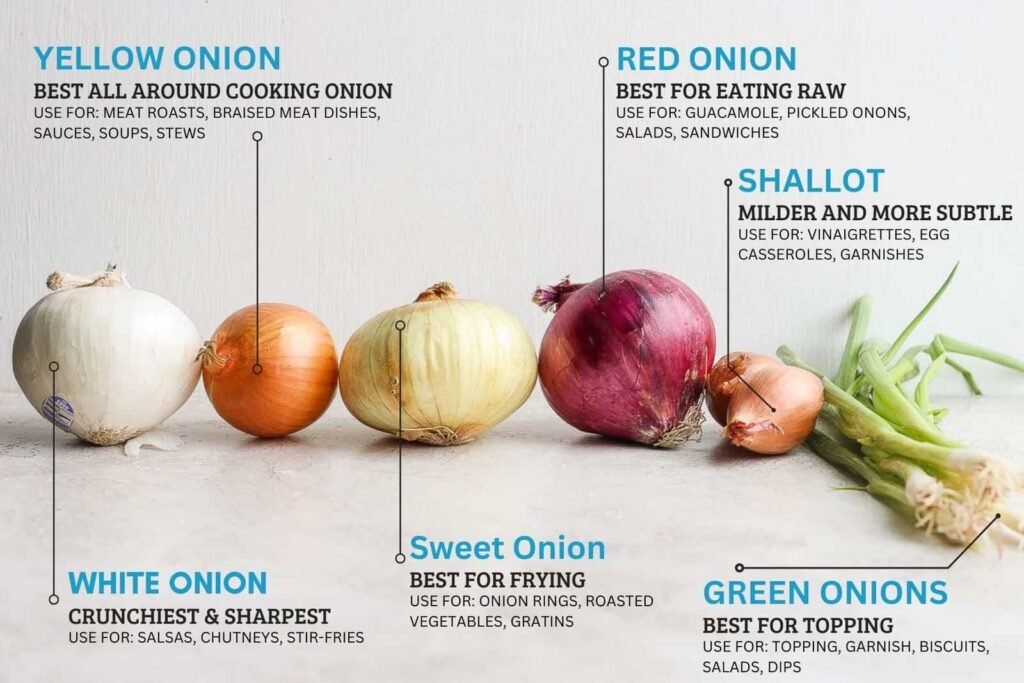4 Extremely Healthy Benefits of Onions

The onion, a staple ingredient in kitchens around the world, isn’t just a flavor booster—it’s a nutritional powerhouse. Embark on a journey to uncover the hidden dimensions of this humble bulb, exploring its ability to tantalize our taste buds while fortifying our well-being.
1: The Gastronomic Allure of Onions
Onions are culinary chameleons, coming in various colors, shapes, and types like white, yellow, red, and green. Each type brings its unique flavor to the table, enhancing the taste of dishes in a distinct way. From the mild sweetness of red onions to the robustness of yellow onions, their flavors are like different instruments in a symphony of taste.
Their adaptability shines whether they’re enjoyed raw or cooked. Sliced or diced, raw onions add a refreshing crunch to salads and a zesty kick to salsas. When heat is applied, the flavors mellow and deepen, transforming into the foundation of savory soups, hearty stews, and aromatic stir-fries. Onions are the secret behind the complexity of flavors that make dishes truly memorable.
2: Nutrients Galore: The Vitamin and Mineral Arsenal
Vitamins and minerals are the body’s allies in maintaining health, and onions are loaded with them.
Vitamin C: Often linked with oranges, also finds a home in onions. This essential vitamin fortifies our immune system, acting as a shield against illnesses and helping wounds heal faster. Think of it as your body’s armor against the outside world.
Vitamin B6 (Pyridoxine): Present in onions, serves as an energy producer. It’s like the fuel that powers various bodily functions, from thinking and moving to growing. This vitamin plays a crucial role in brain development and function, helping produce neurotransmitters that transmit signals between nerve cells. It also assists in the formation of red blood cells and helps regulate hormone activity.
Folate (Vitamin B9): Essential for DNA synthesis and cell growth, folate is particularly important during periods of rapid cell division, such as pregnancy and infancy. It helps prevent certain birth defects and supports overall cellular health.It’s the architect behind the blueprint of growth and renewal within our bodies.
Potassium: A mineral that plays a role in fluid balance, nerve transmission, and muscle contractions. It helps regulate blood pressure and supports the proper functioning of the heart, kidneys, and other organs.
Sulfur Compounds: Onions are well-known for their sulfur-containing compounds, which contribute to their distinctive taste and smell. These compounds, including thiosulfinates and sulfoxides, have been linked to potential health benefits, including anti-inflammatory and antioxidant effects.
3: Antioxidants – Nature’s Guardians
Imagine antioxidants as the superheroes safeguarding our bodies from harm. Onions are a rich source of these protective compounds, acting as defenders against harmful molecules called free radicals. Much like knights ward off adversaries, antioxidants shield our cells from damage caused by these free radicals.
Quercetin: While not a vitamin or mineral, Quercetin is a natural plant compound (flavonoid) found in onions. It has antioxidant properties and is associated with potential health benefits, including heart health and immune support.
Vitamin C: A powerful antioxidant that helps protect cells from damage, supports the immune system, and promotes skin health. It also aids in the absorption of iron from plant-based foods.
Vitamin E: Although present in smaller amounts, onions also contain vitamin E, a fat-soluble antioxidant that helps protect cells from oxidative damage.
Anthocyanins: These are water-soluble pigments responsible for the red and purple hues in certain onion varieties, such as red onions. Anthocyanins have antioxidant properties and are known to contribute to the potential health benefits of onions.
Organosulfur Compounds: These compounds are formed when onions are cut or crushed, leading to the release of substances like Allicin. Allicin is known for its potential antimicrobial and heart-protective properties. While not directly antioxidants, these compounds may indirectly contribute to the overall health benefits of onions.
This protective prowess translates into heart health. By neutralizing free radicals, onions contribute to lowering our chances of various chronic diseases, including but not limited to heart disease, cancer, and neurodegenerative disorders. Just as a strong fortress defends a kingdom, antioxidants in onions help fortify our bodies against potential threats.
4: Pacifying Inflammation: Onions’ Calming Touch
Inflammation is our body’s response to combat invaders, but sometimes it gets out of control. Inflammation can present as a double-edged sword. Onions contain compounds with anti-inflammatory properties that help restore balance. It’s like a soothing balm for the body’s irritated areas.
Quercetin: Anti-inflammatory properties associated with potential health benefits, including heart health and immune support.
Allicin: Allicin is a sulfur compound that is produced when garlic is crushed or chopped, and it’s also found in onions. It has been linked to potential anti-inflammatory effects and may help modulate the immune system’s response to inflammation.
The anti-inflammatories present in onions act as mediators, calming down the inflammation and providing relief. This effect can be particularly beneficial for conditions like arthritis, where inflammation leads to joint discomfort. Onions, in essence, offer a natural remedy that’s akin to a gentle, internal hug, promoting comfort and well-being. While research on the specific anti-inflammatory effects of onion compounds is ongoing, including onions in your diet can contribute to a diverse range of beneficial nutrients and compounds that may help support a healthy inflammatory response. It’s important to note that while certain components in onions show promise in reducing inflammation, the overall impact can vary based on factors such as individual health and dietary patterns.
Conclusion
As you encounter onions in your culinary adventures, perceive them not only as flavor enhancers but also as nutritional powerhouses. Their ability to elevate taste while contributing to your health makes them an invaluable addition to your meals. With onions, your plate becomes a canvas where taste and well-being converge in a harmonious balance.


